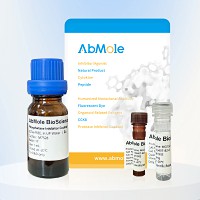All AbMole products are for research use only, cannot be used for human consumption.

Recombinant Human HGFR Protein is a glycosylation receptor tyrosine kinase, which plays a central role in epithelial morphogenesis and cancer development. HGFR is usually expressed by epithelial cells, and the expression of HGF is limited to mesenchymal cells. Under HGF stimulation, HGFR induces several biological responses, which together produce a program called invasive growth. Abnormal HGFR activation in cancer is associated with poor prognosis. Abnormally active HGFR triggers tumor growth, forms new blood vessels (angiogenesis), provides nutrition for the tumor, and cancer can spread to other organs (metastasis). In many types of human malignancies, including kidney cancer, liver cancer, stomach cancer, breast cancer, and brain cancer, HGFR is deregulated. HGFR mediates a complex procedure called invasive growth. The activation of HGFR triggers mitosis and morphogenesis.
Recombinant Human HGFR expressed the target gene encoding Glu25-Thr932 with a human IgG1 Fc tag at the C-terminus.
Accession: P08581
Apparent Molecular Weight: 170&100-130&45-50 KDa, reducing conditions
Endotoxin < 1 EU/µg
Lyophilized from a 0.2 μm filtered solution of PBS, pH 7.4.
| Form | Lyophilized powder |
| Solubility (25°C) | Reconstitute the lyophilized powder in distilled water up to 100 μg/ml. |
| Storage | Stored at ≤ -20°C, stable for one year after receipt. Reconstituted protein solution can be stored at 2-8°C for 2-7 days and at -20°C for 3 months. |
| Related Cytokines and Growth Factors Products |
|---|
| Recombinant Human GDF-15 Protein (HEK293 N-hFc)
Growth-differentiation factor 15 (GDF15), also known as MIC-1, is a secreted member of the transforming growth factor (TGF)-β superfamily. GDF-15 has a role in regulating inflammatory and apoptotic pathways in injured tissues and during disease processes. GDF-15 overexpression arising from an expanded erythroid compartment contributes to iron overload in thalassemia syndromes by inhibiting hepcidin expression. |
| Recombinant Human FGFR1 Protein (HEK293, C-His)
FGFR1, also known as CD331, is a full-length representative protein consists of an extracellular region, composed of three immunoglobulin-like domains, a single hydrophobic membrane-spanning segment and a cytoplasmic tyrosine kinase domain. |
| Recombinant Human FGFR2 Protein (HEK293, C-His)
FGFR2, also known as CD332, acts as cell-surface receptor for fibroblast growth factors and plays an essential role in the regulation of cell proliferation, differentiation, migration and apoptosis, and in the regulation of embryonic development. FGFR2 plays an essential role in the regulation of osteoblast differentiation, proliferation and apoptosis, and is required for normal skeleton development. It also promotes cell proliferation in keratinocytes and imature osteoblasts, but promotes apoptosis in differentiated osteoblasts. |
| Recombinant Mouse BMP-4 Protein (E. coli, C-His)
Bone Morphogenetic Protein-4 (BMP-4) is a critical signaling molecule required for the early differentiation of the embryo and establishing of a dorsal-ventral axis. BMP-4 is secreted from the dorsal portion of the notochord, and it acts in concert with sonic hedgehog to establish a dorsal-ventral axis for the differentiation of later structures. |
| Recombinant Human Coagulation Factor X (HEK293, C-Fc)
Coagulation factor X, belongs to the peptidase S1 family. Coagulation factor X is initially synthesized in the liver. Coagulation factor X is a vitamin K-dependent glycoprotein that converts prothrombin to thrombin in the presence of factor Va, calcium and phospholipid during blood clotting. |
All AbMole products are for research use only, cannot be used for human consumption or veterinary use. We do not provide products or services to individuals. Please comply with the intended use and do not use AbMole products for any other purpose.


Products are for research use only. Not for human use. We do not sell to patients.
© Copyright 2010-2024 AbMole BioScience. All Rights Reserved.
